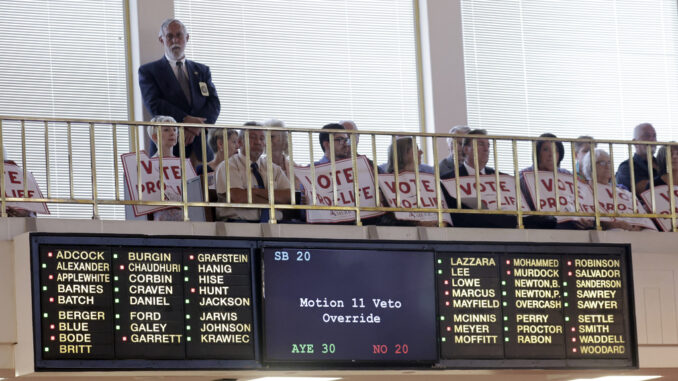
RALEIGH — The North Carolina General Assembly had a busy year on Jones Street.
Over the course of the 2023 session, 704 bills were introduced in the Senate and 895 in the House with 402 making the crossover filing deadline. As of the end of November, 151 bills had become law, including hot topics such as a 12-week limit on abortion, universal school choice expansion and Medicaid Expansion.
One of the most significant dates in this year’s session came on Thursday, April 5.
That is when Mecklenburg County Rep. Tricia Cotham officially announced she was leaving the Democratic Party for the Republican Party, giving the GOP an official supermajority
“I’m a single mom, small business owner, teacher, public servant, and today I add Republican to that list,” said Cotham at a well-attended press conference.
In her remarks, Cotham talked about how she felt cast aside by state Democrats, talked about the need for school choice and drew furious responses from her former party.
Cotham’s move – and vote – was consequential in a number of areas.
Republicans in passed legislation over Cooper’s vetoes that modernized state abortion laws, banned puberty blockers and other gender transition procedures for minors and prohibited biological males from participating in female-designated sports over spring and summer.
The laws received national attention and backing from 12-time All-American swimmer and national figure in the fight for women’s rights in sports Riley Gaines, who testified in front of various committees in support of the bill prior to its passage.
Additionally, North Carolina High School volleyball player Payton McNabb also testified in favor of the measure, describing for lawmakers how a forceful blow to the head from a volleyball spike by a biological male playing on an opposing team resulted in her suffering a traumatic brain injury.
Several months late, the legislature also passed its 2023-24 budget which Democratic Gov. Roy Cooper refused to sign and took effect without his signature. The governor’s complaints about the budget delays centered on Medicaid Expansion being tied to the budget’s passage.
Negotiations would break down between House and Senate leaders over topics such as whether to bring rural economic development districts, clever wording for casinos, to three rural counties. The stalemate would end without passage of casinos but the topic is expected to re-emerge in 2024.
The 2023 Appropriations Act includes $29.8 billion in FY 2023-24 and $30.9 billion in FY 2024-25. Education spending increased again to $17.3 billion in year one and $17.9 billion in year two; a 6.1% and 9.5% increase, respectively.
The budget included an aggressive tax package, taking the personal tax rate from its current 4.75% down to 4.5% in 2024 with revenue triggers for additional rate cuts down to 3.99% in 2026. Additionally, the budget contains millions for pro-life and crisis pregnancy centers, prohibitions on COVID-19 vaccination requirements for state workers and K-12 public school children, as well as over $363 million for agriculture and state natural resource priorities.
With the violent and destructive 2020 riots not too far in the rearview mirror, a bill increasing criminal penalties on rioters also became law. The bill was sponsored and promoted by House Speaker Tim Moore (R-Kings Mountain), who witnessed the 2020 rioting, fires and looting in Raleigh firsthand. After its enactment, the NC ACLU subsequently filed a lawsuit to block certain provisions.
Near the end of the session, redistricting bills were enacted into law creating new maps for state House, state Senate and U.S. Congress in North Carolina. The new Senate and Congressional maps both have lawsuits pending.
Several publicized hearings were held during the 2023 session.
The Hurricane Subcommittee of the Joint Legislative Committee on Government Operations held its third hearing March 29 over families still not back in their homes and the continued overall slow recovery efforts by the N.C. Office of Recovery and Resiliency (NCORR) and the Department of Public Safety (DPS).
Also in March, the House Oversight Committee heard testimony from outgoing State Bureau of Investigations Director Bob Schurmeier requesting his agency be made its own independent entity while describing intimidation tactics by Cooper’s Chief of Staff Kristie Jones and General Counsel Eric Fletcher in an effort to force him to resign. A second hearing on the same topic was held in April and the SBI was ultimately made a stand-alone agency through language in the state budget.


